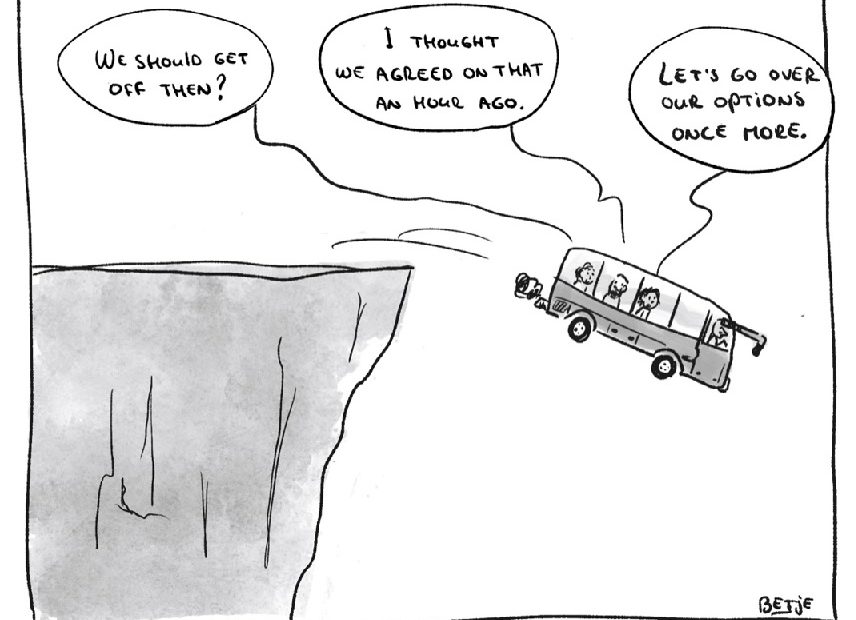What do chicken farms in Gaza, free phone calls in Zimbabwe, a global cyber breach, and a major building renovation at ICRC headquarters have in common?
On the surface not very much. But as participants at an InspiRED Days event in Geneva found out, they are all examples of how good collaboration is increasingly essential – and harder to accomplish – in a world of rapid social, economic, political and environmental change.
So faced with such unprecedented challenges, what tools and techniques can help us collaborate better to find innovative solutions and maximize results?
How do we create the right conditions that enable us to step out of our comfort zones and into a shared space ‘where the magic happens’?
What needs to change for everyone to fully engage in a collaborative process, leaving fixed conceptions behind?
These questions – and the answers to them – lay at the heart of the event organized by the ICRC’s Innovation Team and led by Pablo Suarez, innovation lead at the Red Cross Red Crescent Climate Centre.
See a short film of the event here:
The Speed of Trust
One of the keys to any successful collaboration, says Suarez, is what he calls “trustful beginnings”.
“You need to establish conditions that allow people to express themselves candidly when something is questionable, too disruptive or problematic. We have created an intra- and inter-institutional tradition of not speaking our minds when something’s not working. This allows too many things to go unsaid and means people won’t fully engage.”
Kate Halff, head of Movement Cooperation at the ICRC, agrees that establishing a solid baseline – one where everyone understands where others are coming from – is crucial.
“The challenge when it comes to collaboration is that the initial investment takes time. It can be quite transactional, and this is often not seen as possible or worthwhile because of the speed or complexity of a situation,” she said. “But it’s crucial you set a good foundation. Once you have that, you can then move very quickly – and the results will be worth it.”
Throughout the event, quickfire interactive exercises taught participants techniques on how to keep conversations positive and moving forwards, establish trust and build a shared vision.
“Collaboration without participation is almost impossible,” noted one colleague.
“It’s easy to collaborate when you have a common incentive,” said another.
Chickens & Cyberspace
Further examples of good collaboration came in the form of four turbo talks – short video presentations and exchanges – demonstrating where the ICRC has worked successfully with partners.
Ashraf Al-Saadoni, head of the economic security team for ICRC Gaza, described how a recent heatwave had killed large numbers of chickens, threatening the livelihoods of small-scale poultry farmers.
Through partnering with farmers, communities, government institutions and a local university, solutions were found that not only drastically reduced poultry mortality rates but also had the added benefit of boosting food safety.
ICRC Strategic Technology Adviser Vincent Graf Narbel spoke of the challenge of building trust in cyberspace. He cited as an example the response to the large-scale cyberattack on the ICRC in January this year when hackers accessed the data of half a million people.
The ICRC is setting up a delegation for cyberspace, to be physically based in Luxembourg, to broaden discussions and collaboration on how best to deploy digital services in the humanitarian sphere.
Chickens and cyberspace may make for unlikely bedfellows, but they are symptomatic of the need for smarter, faster, more creative and diverse collaboration and thinking.
Breaking Bad (Habits)
“We need to re-examine some of our collaboration models because otherwise they will be disrupted by force,” warned Suarez.
“Take the climate, for example: catastrophic change is happening at a phenomenally fast pace relative to our expectations. We therefore need to re-imagine how we collaborate with experts and scientists, who are often very bad communicators, to better convince people of the need for immediate action.
“This is why it’s so important that organizations like the ICRC have dedicated teams focused on futures and foresight to spot threats before they affect us and to identify opportunities for transformative collaboration.”
A final tip for fruitful collaboration?
“People embrace – and thrive in – playfulness, so bring some joy to your meetings,” said Suarez.

